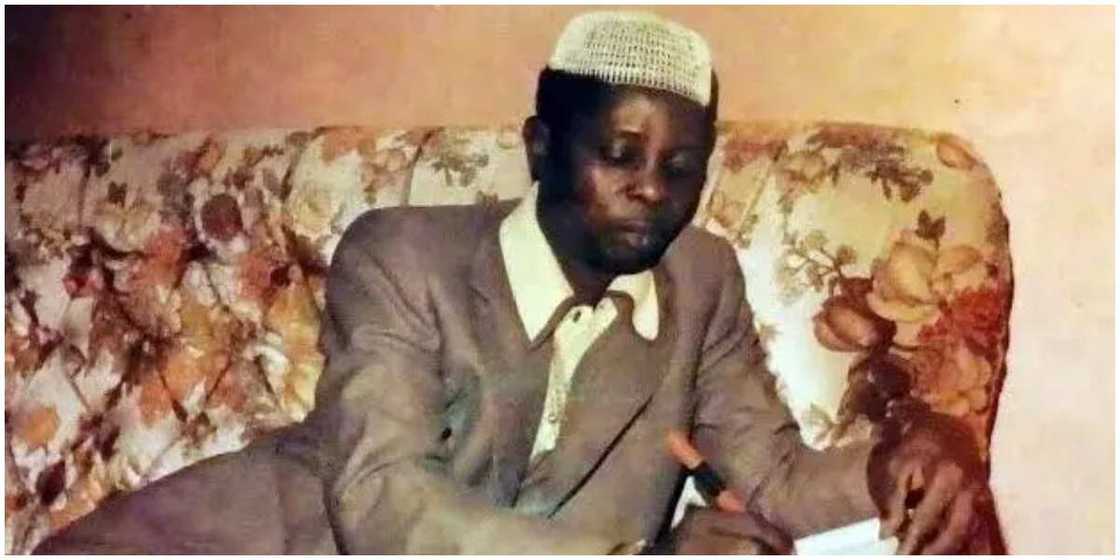Ayinla Omowura: Iconic Apala Musician Whose Untimely Death Brought His Rising Career to a Crashing Halt
Over 40 years after his famed 'predictable demise', iconic musician Ayinla Omowura, has sneaked into the memories of Nigerians once again— thanks to the recent work of legendary movie maker, Tunde Kelani.
Don't miss out! Join Legit.ng's Sports News channel on WhatsApp now!
Kelani’s eponymous film, Ayinla, hit the cinema some months ago but it wasn’t until its arrival on movie streaming platform, Netflix, that a conversation picked up on social media.
Apart from the commendable attempt to give an insight into a fraction of his life, the star-packed production led by thespian Adedimeji Lateef opened the eyes of many to the events that led to Ayinla’s death.

Source: UGC
Early Life
Born Waheed Ayinla Gbogbolowo in 1933 in Itoko, Abeokuta, Ogun state, the apala music maker was the son of a blacksmith father and trader mother. There are reports that he followed the path of his father during his adolescent years. Sources also claim that he worked briefly as a commercial driver before he found his true calling and embraced music in the 1950s.

Read also
“What a soldier told me after coup plotters abducted my father in 1966,” Fani-Kayode speaks
Authentic records of his childhood memories remain sketchy as he only started to gain attention –and ultimately get documented—when he became a face for apala and started his career as a musician.
He became known as ‘Alhaji’ after performing the Muslim holy pilgrimage in the year 1975. Some of his other popular names include Egun Mogaji, Hadji Costyle, Alujannu Elere and Agbejapa Oba.
Music
The journey into music started for Ayinla Omowura after he was discovered by Adewole Alao Onilu-Ola and offered a position as a singer. Before then, he had been trying his luck as a backup singer for other acts including a famous artiste known as Osho, as disclosed by Oniluola in a 2020 Punch interview.
Oniluola would eventually become Ayinla’s lead drummer when his career picked up.
In the same interview, the drummed told journalist Daud Olatunji how he crossed paths with Ayinla and they started working together.

Read also
Portable accuses Davido of deceiving fans with prices of his accessories: "Says $30k watch is $100m"
“When I discovered him, I tested his skills and discovered that his voice was perfect for what I wanted. It suited my type of Apala beat. I was the founder of the band, so I searched for him to be a musician in my band. Before he joined me, he was working as a backup singer for some people who were his masters in music," he was quoted to have said.
The collaboration with Onilu-Ola was a rewarding one for both parties as they started to draw attention, with many in Egbaland thirsting for their numbers in bars and beer parlours.
A socially conscious musician
Just like the Fela Anikulapo Kuti who churned out socially conscious music that haunted bad leaders, Ayinla’s lyrics started to bite hard when he joined EMI Nigeria record label in 1970, as reported by Culture Custodian.
Ayinla Omowura wasn’t afraid to call out musicians in his music and one such track was titled Eyin Oselu Wa (Our Politicians). The song saw Ayinla calling on leaders to work in unity and drive the nation forward instead of their needless bickering.

Read also
Fuji legend KWAM1's ex-wife, Hafsat Anifowoshe, dies at 65, colleagues send in their condolences
"I saw raw talent and artistic motivation at their best as three albums of 36-minute duration were recorded effortlessly at a go, with the session flowing naturally and smoothly, unhampered by unnecessary breaks arising from musical lapses.
"The whole thing was written in the mind; and as soon as the first percussive note was struck, the session took off with the call and response pattern in which Ayinla waited from one chorus to another, establishing social commentaries with thought-provoking proverbial and anecdotal lines," writer Benson Idonije who once watched Ayinla perform in the 70s wrote in his article, Alhaji Ayinla Omowura,colossus of African music.
Apart from politicians, Ayinla also used his music as a vessel to preach against promiscuity, bleaching and badly behaved housewives.
Death
Kelani’s film opened the eyes of young and previously uninformed Nigerians about rumoured circumstances that led to Ayinla’s death.
In the movie, the musician had been in the middle of preparations for his first tour in London facilitated by a partnership between his manager (played by Mr Macaroni) and Bisi Ajala (played by Kunle Afolayan).
However, Ayinla’s insistence to have a lover (played by Omowunmi Dada) on the trip didn’t augur well with the manager who still harboured grudges about the lady ditching him for the musician.
This led to a rift between the two, with both parties severing interactions with each other for the time being. A reflection on the part of both individuals motivated them to meet up at the bar where a physical fight ensued and ultimately led to the death of Ayinla.
In his article Anigilaje In A Nutshell: The Man, His Immortality Ring and Mr. Death, writer Odolaye Baa Waki Aremu presented an eyewitness account of what happened on the day Ayinla died.
Excerpt below:
“Eyewitness account related how he paraded himself around Abeokuta, with blood dripping from a nasty head wound- a fatal 'parting' gift from one Baiyewu, a friend-turned-foe, and a former band member on that fateful day of his death in 1980.

Read also
Oluwatimileyin Ajayi: UK-based man shares things people didn't know about embattled gospel singer
“Common-sense, to seek first-aid in order to self-preserve was entirely overruled-to willingly give room for monumental Ignorance coupled with a pervasive sense of Narcissism, thus resulting in a possibly avoidable fatality. The mercurial Star had wasted vital time needed to seek medical help, while busy making what amounted to an ill-advised streets spectacle of a life-threatening situation. He predictably died that evening from a massive blood loss- secondary to a probable Traumatic Brain Injury.”
Ayinla’s childhood friend, Muhammadu Monsuru, was among those who witnessed his final moments before he was buried according to Islamic writes.
A portion of Kelani's movie saw Monsuru narrating what he personally discovered when the musician’s body was being prepared for burial.
In his words:
“I bathed Ayinla myself. We Muslims have a glove we use when washing our dead as one of our final rites.
“As I was washing his head, the glove caught on something. I pulled the glove because I didn’t know there was anything there. Blood splurted out from his head…from a dead man. And what did we see? A piece of broken glass from the mug.”

Read also
Baba Dee recounts Segun Arinze stopping highway robbery after robbers recognised him: “Black Arrow”
Surely, the late Ayinla Omowura is gone but not to be forgotten by many. Till today, his music continues to enjoy moderate spins in traditional ‘owambe’ gatherings and it is a sure number that rocks Egbaland during ileya festivities…
PAY ATTENTION: Сheck out news that is picked exactly for YOU ➡️ find the “Recommended for you” block on the home page and enjoy!
Source: Legit.ng



